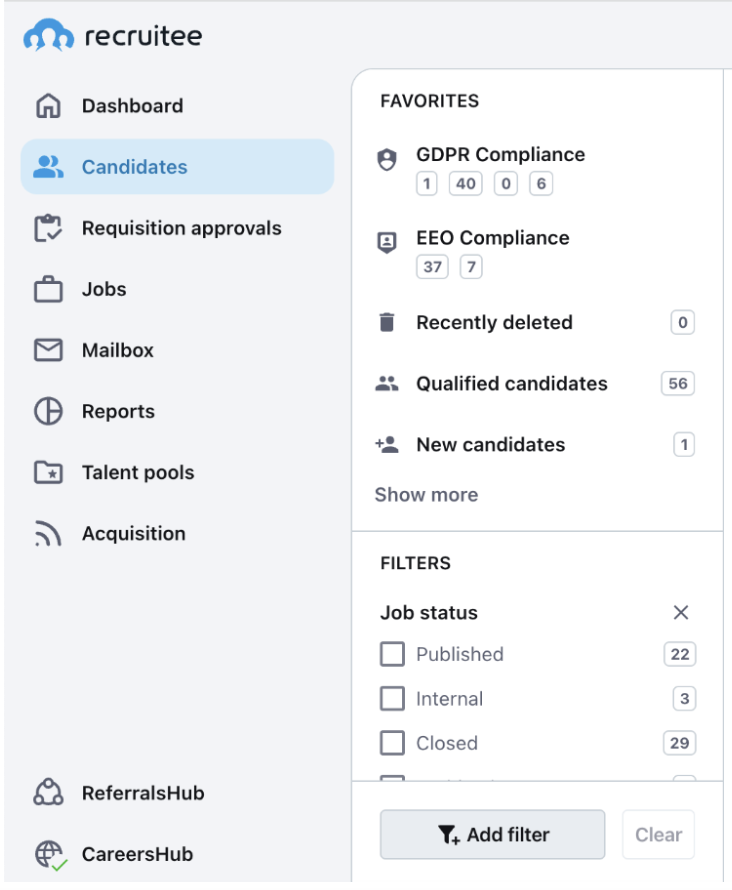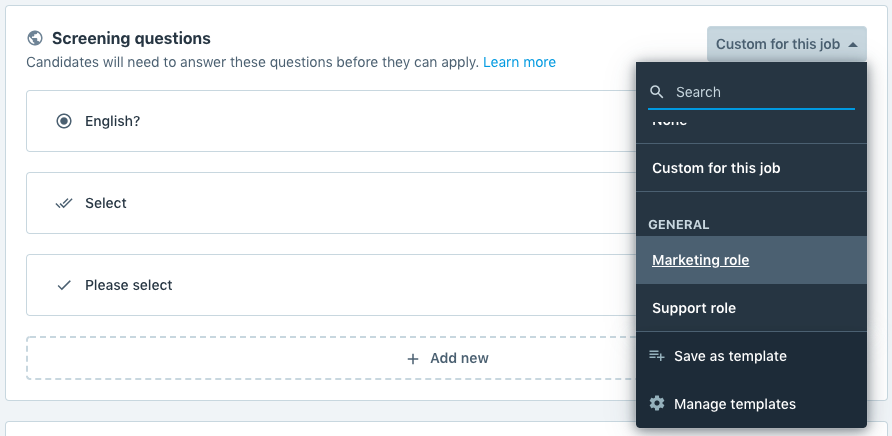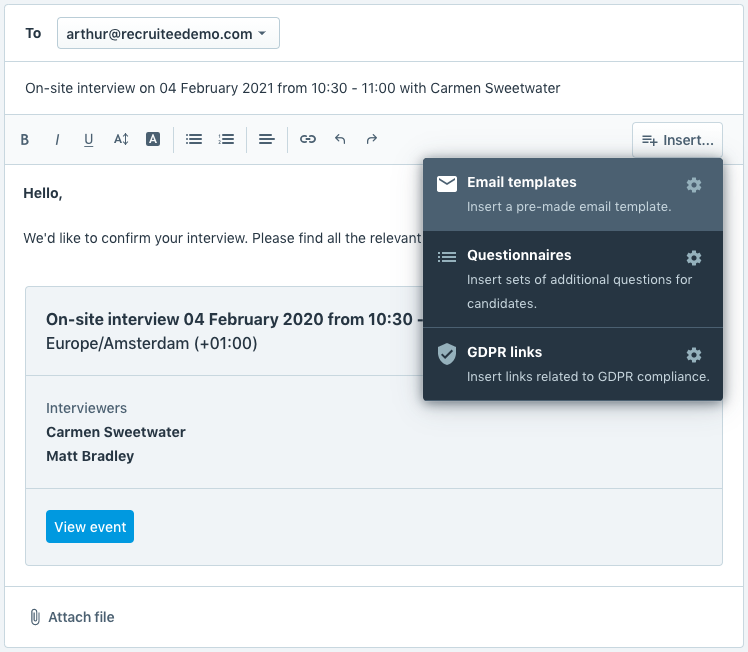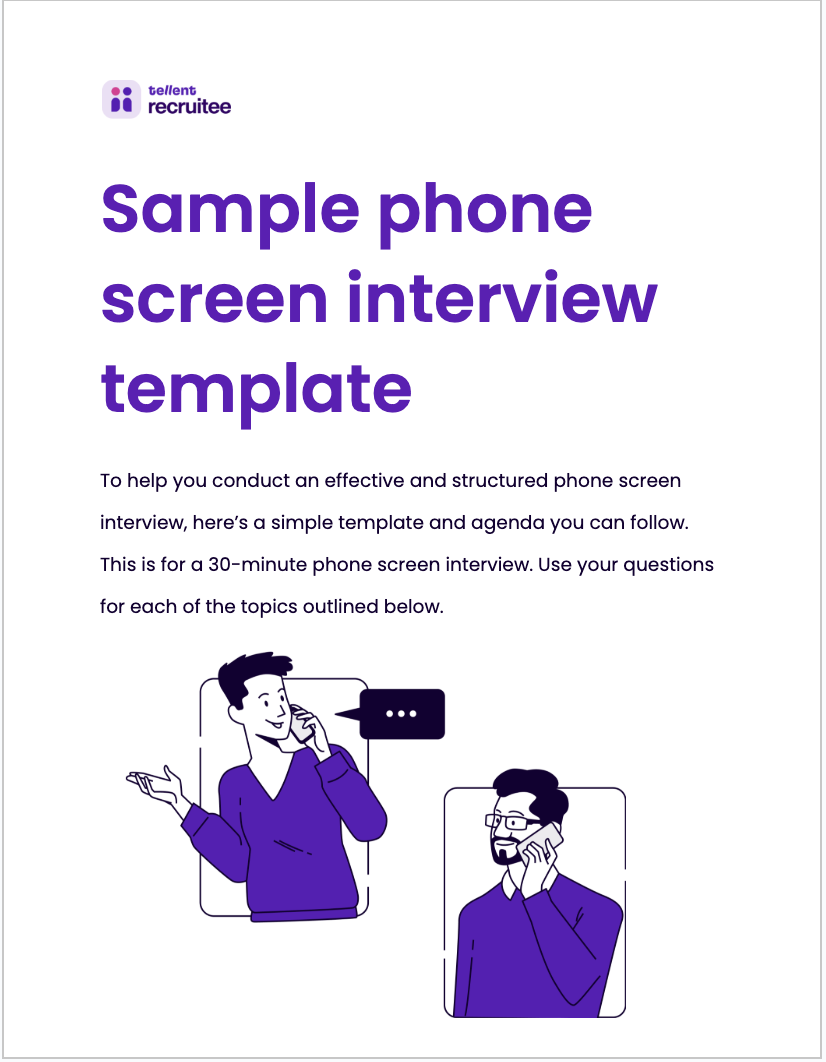Your talent sourcing efforts are on point, and now you have a giant list of highly qualified candidates to choose from. Now what? How do you start to sort through this embarrassment of riches without pulling your hair out or, worse, letting a unicorn candidate sift through the cracks? One great place to start is the good old phone screen interview.
In this article, we’ll walk you through how to conduct a screening interview over the phone, explain what happens after the phone interview, and provide examples of questions you should be asking candidates. But first, let’s talk briefly about what a screening interview is and what it is not.
What is a phone screen interview?
A phone screen interview is a phone call—or a short virtual call—between a candidate and recruiter that is used to determine if the applicant is qualified to move to the next stage of the interview process, and if there is a mutual fit.
When planning and executing your screening interviews, it’s important to remember that this stage is designed to provide a quick and general introduction to a candidate. It is not designed to be an in-depth, customized interview to probe the candidate’s deepest, darkest secrets. That’s why most recruiters follow a phone screen interview template that has standardized questions for each and every candidate.
The focus of your phone screen interview should be to determine if an applicant has the qualifications necessary to do the job. They probe surface-level questions about:
- Background,
- Qualifications,
- Education,
- Salary expectations,
- Reasons for applying and general knowledge of the company,
- And judge communication skills and attitude.
A phone screen interview should not include in-depth job testing or culture testing. Too much, too soon can scare a candidate away. Instead, you should use these interviews to gain enough supplementary information about the candidate to help determine if you want them to come in for an in-person interview or job test.
When done properly, the benefits of a phone screen interview are plenty:
- They let you screen large numbers of candidates quickly, but personally.
- They greatly reduce the number of unqualified candidates you call in for a formal interview.
- They allow you to parse your list quickly, letting you focus on only the best candidates.
- They provide valuable information about a candidate that can be used to steer your in-person interviewing questions.
- They let you test communication and interpersonal skills early in the process.
- Bottom line, they save you time and effort.
If this sounds a bit daunting, don’t worry. We’ve put together a phone interview cheat sheet to help you get started.
Preparing your phone screenings
When getting ready to execute a series of telephone interviews, it’s a good rule of thumb to follow this process of events:
- Manually review your talent pool.
- Narrow your candidate pool to those you want to know more about.
- Create your list of questions.
- Conduct the interview.
- Evaluate the results.
Let’s expand on each of these steps.
Manually review your candidate pool
This can be a bit tedious, but it’s important to review each and every candidate who applies to your position in your talent pool. You don’t want a great candidate falling through the cracks because of applicant overload.
To alleviate some of this workload, use automation and shortlisting features in your ATS to efficiently parse through candidate resumes, Recruitee by Tellent offers powerful tools that allow recruiters to filter and screen candidates effectively, minimizing the need for manual resume reviews.
Start by using Recruitee’s filtering options in the candidate database to narrow down applicants by specific criteria, such as work experience, education, and answers to screening questions. This allows you to immediately remove candidates who don’t meet the required qualifications, making it easier to focus on those who best match the role.

Additionally, you can create custom application forms for each job with screening questions tailored to your hiring needs. By setting certain questions as "knockout" criteria, candidates who don’t meet essential requirements can be automatically disqualified, further reducing the manual sorting needed and helping you focus on the most promising applicants.
Recruitee also lets you save search combinations as favorites, making it easy to apply consistent filters across different job openings or rounds of recruitment.
These tools ensure that only the most relevant candidates make it to the next stage, saving time and helping you maintain a more organized candidate pool.

Narrow your candidate pool
Once you’ve reviewed the resumes, create a preliminary shortlist of candidates that you’d like to call. This could be 10 people, or it could be 100 people. It depends on the number of applicants, and how many you can disqualify immediately.
Don’t be concerned if your “short list” isn’t short. That’s why you’re doing a phone screen interview in the first place. Good screening is a crucial step in shortlisting candidates.
Decide what you need to know about your candidates
You want the best person for the job, but what makes them the best?
Are you looking for someone who can hit the ground running? Someone you can train and mold into the ideal worker? Someone cost-effective? Or someone with a status that will add prestige to your business?
Work with your hiring manager and recruitment team to identify the specific attributes, skills, and experience that you want from your ideal candidate. Stay laser-focused on screening for those characteristics. Don’t focus on details that distract you from what you want and need from your applicant.

Create your list of questions
The next step is to compile the questions you’ll be asking each candidate. The goal at this stage is to understand the job requirements, understand your candidate pool, take into account the company goals and strategy, and come up with questions that screen based on those variables.
Be sure to keep the length of your interviews in mind. Phone screens should be about 30 minutes from start to finish, so the number of questions you write should reflect that timeframe.
We’ll dig deeper into what types of questions you should ask shortly.

Schedule the interview
Next up is the fun part—finding time in everyone’s busy schedule for the phone screen interview. When doing so, make sure to be mindful of the applicant’s time and give them ample opportunity to prepare for the phone call.
We recommend asking what their availability is, and what time constraints exist. This may mean meeting outside of normal business hours if they have a particularly taxing schedule.
To make this back and forth easier, we recommend using Recruitee’s interview scheduling tool, which allows you to view team availability, select ideal time slots for phone screens, and automate notifications to all attendees. This ensures a seamless scheduling experience for both candidates and recruiting teams.

This helps you find time in your—and your recruiting team’s calendars—and send invitations to candidates via email.
Conduct the interview
You’ll want to schedule an appointment for the interview with each candidate, both out of courtesy and to allow some time for preparation. You can either email each candidate directly or leverage tools like an ATS and booking platforms to send out automated requests to schedule interview times in your calendar. SMS also works nicely for this.
Call your candidate at the scheduled time, and run through the list of prepared questions. It’s important to treat this like a structured interview, whereby you ask each candidate the exact same questions in the same order.
Asking each candidate the same questions during a phone screen interview lets you objectively evaluate each one, which in turn helps determine who makes it to the next round.
Leave time for the candidate to question you
The candidate is interviewing you just as much as you’re interviewing them. At this stage, they only know high-level information about your company and may have never interacted with an employee before. You’re their first point of contact, so it’s your job to be inviting and open to their questions as well.
Leave time at the end of the interview to answer questions from the candidate to the best of your ability. If you don’t know the answer, then we’d recommend noting them down and sending them to the hiring manager if you feel that the candidate is a viable contender to move forward in the interview process.

Explain next steps
At the end of phone screening—after all questions have been asked and answered—tell the candidate what comes next. This includes when they’ll hear from you, what the potential next steps in the interview process will be, and who they are likely to meet with.
If the interview didn’t go well, you may also decide to provide on-the-spot feedback to that effect. Try to provide constructive feedback that the candidate can use going into their next phone screen interviews.
Evaluate the results
When your screening interviews are finished, evaluate the results using your scoring rubric. You can then go through a second round of parsing down your candidates, focussing on the ones who you’d like to meet and screen in person.
With Recruitee’s evaluation tools, you can streamline the assessment process by adding quick evaluations or detailed evaluation forms to each candidate’s profile.
Each evaluation contributes to an overall score using a standardized rating scale, helping you and your team quickly compare candidates based on their screening and interview performance. This scoring system centralizes feedback and provides a clear summary of top candidates, making it easy to decide who should advance to in-person interviews.
Phone screen interview questions to ask your candidates
Now that we’ve gone through the process to prepare for a phone screening, let’s look at some questions you can ask your candidates.
Generally speaking, your telephone interview questions should fall into one of the following categories:
- Background information
- About the candidate
- Desire for the job and fit
- Knowledge of the company
- Salary expectations
- Resumes points that need more information or clarification.
Let’s take a look at some examples for each.
Background information
The first thing you should do when you start a telephone interview is ask the candidate to verify and confirm the information on their resume. This will help ensure that you’re working with the right information for your evaluation, and can also shine a light on anything that might need some further clarification.
Background queries can either be framed as a simple list of yes or no questions to confirm information, or they can prompt the candidate to explain anything they may or may not have included in their resume. The goal is to gather and confirm all information about the candidate’s experience, education and work history that relates to your position.
Telephone interview questions in this phase might look like:
- What’s your working background?
- Why are you currently looking for a new job?
- How far into your job search are you, and have you seen any positions that have piqued your interest?
- What’s your availability? Will you have to work a specific notice period?
- Who was your last employer, and what was your role?
- What were your primary responsibilities?
- Why are you / why did you leave that position?
- What experience do you have that relates to this application?
Keep this section short, and verify only the most important information.
About the candidate
Next, you can move into some general phone questions about the candidate. Be sure to keep these closely related to the position, and don’t pry too much at this stage of the process. The goal with these questions is to get an idea of the candidate’s personality, what they’re looking for, and whether or not they seem like a good fit.
Some phone questions to ask the candidate about themselves could be:
- Tell me about yourself.
- What are you looking for in your next job?
- What is important to you in your career?
- What motivates you?
- What kind of work environment do you like?
- What do you like to do in your free time?
These questions will help the candidate open up and show off their personality and communication skills. They will also give you insight into how the candidate’s values and goals align with your organization’s.
Desire for the job and fit
Questions about the candidate lead into perhaps the most important evaluation of the phone interview: why the candidate wants to join your company, and how well they’ll fit in. Getting a clear insight into a candidate’s motive for applying will give you valuable intel into how engaged they will be throughout the hiring process, and on the job, if they’re chosen.
The focus of these questions should be to get a handle on why they want this job, why they want to leave their old job (if applicable), and how they would interact and perform with your team.
Here are some questions to ask during a phone interview to determine those answers:
- What made you decide to look for another job?
- What has this position got that your current role doesn’t provide?
- Can you tell us about your responsibilities in your current role?
- Where does your motivation come from?
- Why did you apply for this position?
- Why do you want to leave your previous job?
- What do you think this job will fulfill for you that your current job doesn’t?
- What value do you think you could bring to the team?
While it’s natural to try and pry as much information about the candidate as possible for these questions, it’s important to remember that this is just an introductory interview. Don’t be too forceful or deep about your questions at this stage, or you may scare the candidate away.
Knowledge of the company
From there, you should test the preparedness of the candidate for the phone interview. A great way to do this is to ask questions that determine how well the candidate knows your company or the position they applied for.
Some telephone interview questions you can use here are:
- Why would you like to work for us?
- Have you come across our company in your day-to-day life?
- What attracted you to our organization?
- How would you describe what we do?
- What are our core product and service offerings?
- How do your skills and experience relate to the job description?
It’s good practice to ask open-ended questions that require a certain amount of knowledge about your company to answer. Questions that relate to your brand, messaging, products and services, or values are all great ways to determine how well the candidate prepared for the call (provided the information is publicly available).
Salary expectations
Salary expectations help you determine whether or not you’ll be able to meet the candidate’s requirements early in the process. If your figures are dramatically different, then it’s good to catch that early on so as not to waste anyone’s time.
However, this can be a sticking point for some candidates, and it’s up to you to determine whether or not you’d like to include it in your evaluation. If the candidate declines to answer, be prepared to bring it up later in the interview process when they’ve learned a bit more about the role.
Two simple questions to ask for this could be:
- How much would you like to earn?
- What would be your ideal salary if we wanted you for the position?
- Do you have specific benefits or perks in mind?
- What if we couldn’t offer you your ideal salary? Would you be open to negotiation? Would any other benefits make up for lack of remuneration?
Again, it’s important to not be too forceful at this stage of the screening process.
Questions asking for more information or clarification
The last group of telephone interview questions you should ask are specific to the individual candidate you’re talking to. If you noticed any red flags or question marks in the resume, such as long gaps in employment or lots of jumping between companies, then this is the time to ask the candidate about it. The goal is to get a full and clear picture of the candidate’s background that you can use to guide your evaluation.
Things to listen for during the phone screen interview
When conducting your phone screening, it’s important to pay attention to the following attributes for each candidate:
- Critical thinking skills, or how well they can adapt and react to your questions on the fly.
- Soft skills, such as communication, personality, and personability.
- How each of the above jives with your company culture and values.
In the same vein, here are some red flags you should watch for:
- Negative attitude
- Low energy
- Discrepancies between their application and answers
- Lack of preparedness
- Lack of enthusiasm about the company or position
- Negative comments about former employers
- A focus on money and benefits.
These red flags may be indicators of the candidate being disinterested in the position, lacking professionalism, or being focussed on the wrong priorities. It’s up to you to identify and determine if these red flags are a deal breaker, or if there are enough positives to move forward with the candidate.
Mistakes to avoid when conducting phone screen interviews
Again—don’t forget that the phone screen interview is a two-way conversation. Candidates will also be looking for their own red flags that may make them lose interest in the position.
Here are five common mistakes to avoid when conducting phone screen interviews.
- Not preparing properly. Failing to review a candidate’s resume or develop a list of questions beforehand can result in a disorganized and inefficient interview. Candidates may lose interest if they feel the interviewer is not familiar with their background. Beyond that, coming to the interview unprepared is just plain rude and likely something you would consider as disqualifying if the roles were reversed.
- Asking inconsistent questions. To fairly compare candidates, you need to ask each one the same core questions. Inconsistent questioning makes it harder to objectively evaluate responses and leads to biased decisions. Create a list of structured interview questions that you follow for every candidate. This will ensure that everyone is assessed on an equal playing field.
- Focusing too much on salary early on. While it’s important to gauge salary expectations, focusing too heavily on compensation at the start of the process can leave candidates feeling like the job itself is secondary. Wait until later in the conversation or even later stages of the interview process to have a deeper conversation about compensation. That being said, be forthcoming and transparent with salary ranges if the candidate asks. You don’t want to focus too much on it, but you also don’t want to be seen as withholding information.
- Talking too much. While it’s tempting to share lots of information about your company, a phone screen is not the time to dominate the conversation. Aim to keep the candidate talking so you can better assess their fit for the role. Leaving time at the end for questions is another good way to tilt this balance more equally.
- Skipping next steps. Never leave the candidate hanging. Be sure to outline the next steps at the end of the interview and let them know when they can expect to hear back.
Avoiding these mistakes ensures that the phone screening process is structured, respectful of the candidate’s time, and ultimately more productive.
Sample phone screen interview template
To help you conduct an effective and structured phone screen interview, here’s a simple template and agenda you can follow. Click on the image below to access the template. Make a copy of the document to edit and use it for your own interview process.

Some parting tips for how to conduct a phone screen interview
Like any time you interact with the public as a representative of your company, it’s important to present yourself with an air of professionalism during every screening interview.
To help with this, it’s important to practice proper phone interview etiquette. This means being polite and fair, respecting the candidate’s time, and staying focussed on the task at hand. Remember, the candidate is evaluating you just as much as you are them.
Treat each and every telephone interview like it’s the most important one you’re doing that day, and you’ll be successful in how you process and screen every candidate that clicks apply.
—
Need some inspiration for what to ask candidates during phone screening interviews? Download our free Phone Interview Questions Checklist, which features 42 questions to ask and best practices to follow to ensure a successful phone screen.
Phone screen interview FAQ
What is a phone screen interview?
A phone screen interview is a brief call between a recruiter and a candidate to assess basic qualifications, skills, and fit for the role, serving as a first step in the hiring process.
How is a telephone interview conducted?
A telephone interview is conducted by scheduling a time for the recruiter to call the candidate, during which they ask a set of standardized questions to evaluate the candidate’s background, qualifications, and interest in the role.
What is the purpose of a phone screen interview?
The purpose of a phone screen interview is to quickly determine whether a candidate meets the basic qualifications for the role and if they should move forward to the next stage of the interview process.
How do you start a phone screen interview as the interviewer?
Start a phone screen interview by introducing yourself, explaining the purpose of the call, and outlining what the interview will cover and how long it will take.








